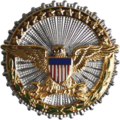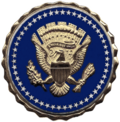Charles Cooper II
Charles Cooper II | |
|---|---|
 | |
| Born | 1967 (age 56–57) Winston-Salem, North Carolina |
| Allegiance | United States |
| Service | United States Navy |
| Years of service | 1989–present |
| Rank | Vice Admiral |
| Commands | United States Naval Forces Central Command United States Fifth Fleet Naval Surface Forces Atlantic Expeditionary Strike Group 7 United States Naval Forces Korea USS Gettysburg (CG-64) USS Russell (DDG-59) |
| Battles / wars | Gulf War War in Afghanistan |
| Awards | Navy Distinguished Service Medal Defense Superior Service Medal (2) Legion of Merit (4) Bronze Star Medal |
| Alma mater | United States Naval Academy (BS) National Intelligence University (MS) United States Army Command and General Staff College Harvard University Tufts University |
| Spouse(s) | Susan Cooper[1] |
Charles Bradford "Brad" Cooper II[2] (born 1967)[3] is a United States Navy vice admiral who has served as the deputy commander of United States Central Command since February 2024. He most recently served as commander of United States Naval Forces Central Command, Commander, United States Fifth Fleet and Commander, Combined Maritime Forces from 2021 to 2024.[4][5] He previously served as Commander, Naval Surface Forces Atlantic and, before that, as the Chief of Legislative Affairs of the United States Navy.[6][7]
Cooper attended Sidney Lanier High School in Montgomery, Alabama. He is a 1989 graduate of the United States Naval Academy.[2] Cooper later earned a master's degree in strategic intelligence from the National Intelligence University.[6] During his tenure as commander of Naval Forces Korea, Cooper was bestowed the Korean name Goo Tae-il[a] by the ROK-US Alliance Friendship Association in honor of his service to the Korean peninsula.[8]
In April 2023, Cooper was nominated for reappointment as vice admiral and assignment as the deputy commander of United States Central Command.[9][10]
Awards and decorations
[edit]
| ||

| ||

| ||

| ||
Notes
[edit]- ^ In this Korean name, the family name is Goo.
References
[edit]![]() This article incorporates public domain material from websites or documents of the United States Government.
This article incorporates public domain material from websites or documents of the United States Government.
- ^ "White House Author – Brad Cooper". November 18, 2011. Retrieved June 5, 2021.
- ^ a b Burylo, Rebecca (January 23, 2017). "Lanier grad promoted to rear admiral". Montgomery Advertiser. Retrieved May 3, 2021.
- ^ Register of Commissioned and Warrant Officers of the United States Navy on Active Duty. Bureau of Naval Personnel. October 1, 1990. p. 180. Retrieved June 5, 2021.
- ^ "Vice Admiral Brad Cooper". Retrieved May 6, 2021.
- ^ "NAVCENT, U.S. Fifth Fleet, CMF Change of Command". U.S. Naval Forces Central Command. May 6, 2021.
- ^ "Flag Officer Announcements". U.S. DEPARTMENT OF DEFENSE.
- ^ Lee Chi-dong (July 19, 2017). "U.S. naval commander to get Korean name". Yonhap News Agency. Retrieved June 30, 2021.
- ^ "PN545 — Vice Adm. Charles B. Cooper II — Navy". U.S. Congress. April 20, 2023. Retrieved April 20, 2023.
- ^ "Flag Officer Announcements". U.S. Department of Defense. April 24, 2023. Retrieved April 25, 2023.
- 1967 births
- Living people
- Sidney Lanier High School alumni
- United States Naval Academy alumni
- National Intelligence University alumni
- Recipients of the Legion of Merit
- United States Navy admirals
- Recipients of the Defense Superior Service Medal
- Recipients of the Navy Distinguished Service Medal
- People from Winston-Salem, North Carolina
- United States Navy personnel stubs
